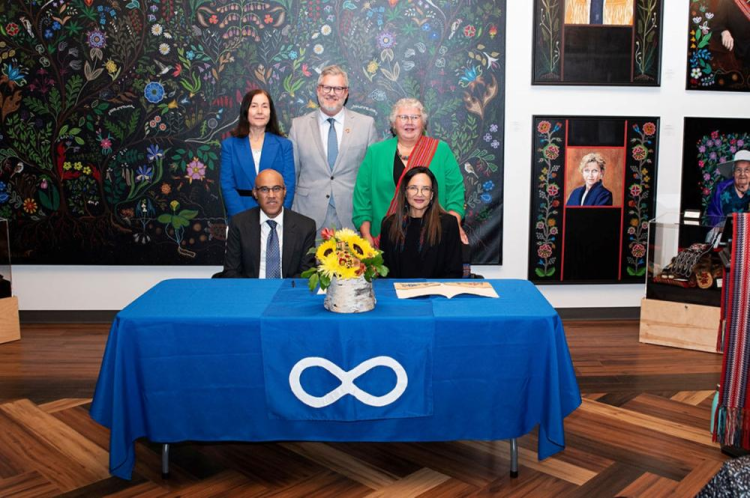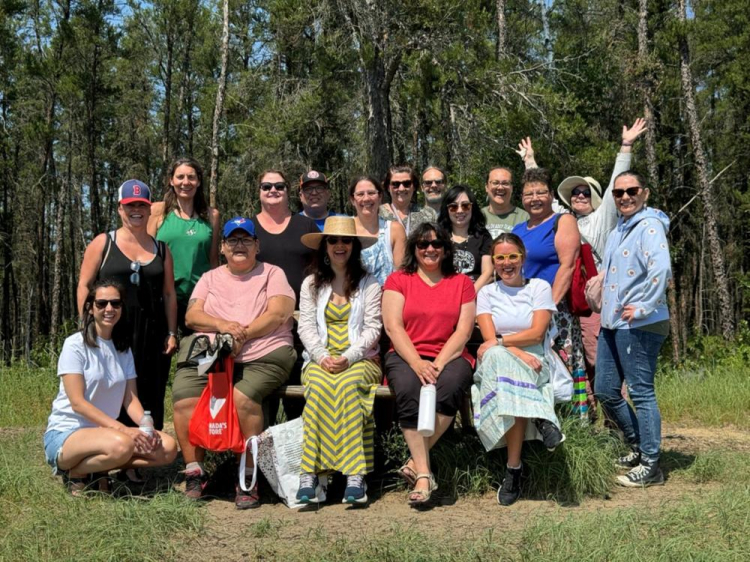Last week, the University of Regina and the Gabriel Dumont Institute (GDI) celebrated the renewal of their affiliation agreement, reinforcing their commitment to collaborate on educational opportunities for the Métis community.
Through their renewed partnership, both institutions will continue to deliver fully accredited undergraduate and graduate post-secondary programs that support the advancement of Métis culture and heritage, including the newly introduced Indigenous Education Doctorate Program. The three-year doctorate is offered in Prince Albert and emphasizes Métis local knowledge, history, spirituality, and culture.
Working together since 1980, the U of R and GDI have a longstanding history of cooperating to provide high-quality education that meets the needs of Métis students. The renewed affiliation agreement solidifies this relationship, ensuring that both institutions can continue to build on their shared goals of promoting Métis culture, language, and history while delivering exceptional academic programs.
SUNTEP taught me things about my family and myself that I would never have discovered without my experiences in the program. Victoria Parisien BEd'15, MEd'22, Manager, Ministry of Language, Métis Nation-Saskatchewan
The first program offered in partnership between the U of R, GDI, and the Ministry of Advanced Education was the Saskatchewan Urban Native Teacher Education Program, which began in 1980 - the same year that GDI was created. The program, offered at the U of R, was developed to address a need for Métis teachers to be represented in classrooms and a desire to educate people on Métis history and have role models in schools for Indigenous children.
Over four decades later, Jeannine Whitehouse BEd'01, MEd'16, Program Head for SUNTEP Regina, says the program's small class sizes and cohorts of around 15 to 20 students (with whom they stay with throughout the duration of their four-year program) that are assigned a dedicated faculty member are just a few of examples of things that help the program, and its students, continue to be successful.
"We really emphasize a feeling of community and support as students make their way through the program," says Whitehouse. "This can include spending time with Old Ones and Knowledge Keepers, and ensuring that students can find ways to give back to the community."

Back row L-R: Dr. Nilgün Önder, U of R Associate Vice-President (Academic), Dr. James Nahachewsky, U of R Dean of the Faculty of Education, and Viola Bell, GDI Board of Governors Vice-Chair. Front row: Dr. Aziz Douai, U of R Dean of the Faculty of Graduate Studies and Research and Lisa Bird-Wilson, Gabriel Dumont Institute CEO. Credit: Juli Labrecque Photography
One of the unique parts of the program comes at the end of the first year, where students attend a three-week Michif immersion camp in the Qu'Appelle Valley, around the Lebret area of Saskatchewan. It includes an emphasis on cross-cultural education, Métis and First Nation people's history and culture, the Michif language, and land-based learning throughout the program.
Several of the classes have a Métis-specific component to them. For example, in INDG 221 - Métis Culture and History, the class visits Winnipeg where they explore the Hudson's Bay Company Archives and look at their genealogy and find ways to connect with their Métis ancestry.
SUNTEP students graduate with a Bachelor of Education degree and can apply for a Saskatchewan teaching certificate. Once they receive their certificate, they can teach anywhere in the province, from Kindergarten to Grade 12.
A "transformative" experience
Victoria Parisien BEd'15, MEd'22 graduated from SUNTEP in 2015. However, she wasn't always drawn towards a teaching career. With a long history of family members who graduated from SUNTEP and became teachers, she felt the urge to do something else entirely.
"My grandmother, my father, his two brothers, and one of my older cousins were all SUNTEP alumni who became teachers, so our family gatherings were often filled with what felt like endless conversations about teaching," says Parisien.
After graduating from high school, Parisien's grandmother encouraged her to consider SUNTEP. With no clear direction, but a willingness to "give it a try," she enrolled.
"It only took one semester for me to understand why my family held SUNTEP in such high regard," says Parisien. "It's more than just a teacher education program; it's a place where generations of Métis people have come to rediscover and reclaim their heritage."
Parisien says that her experience at SUNTEP was transformative, but it is certainly not for those without determination. Throughout the program, the facilitators embraced a family-oriented approach rooted in Métis values; however, the program was also rigorous, demanding, and held to incredibly high standards much like the expectations within Métis families.
"Throughout my career, my first principal, superintendent, new teacher coach, and other educators frequently commented on my unusually strong grasp of outcomes-based teaching and learning," says Parisien. "I believe this was largely due to SUNTEP's small class sizes, personalized attention, and comprehensive support system, all of which better equipped me for the challenges of a career in education."
After graduating from SUNTEP - and armed with her teaching certificate - Parisien worked with Regina Catholic Schools (RCSD) for eight years.
She began as a middle years teacher at St. Joan of Arc School, where she taught alongside her uncle and fellow SUNTEP alum, Clayton Parisien. Then, in 2018, she became part of the RCSD "Connected Educator" project, which aimed to help teachers integrate technology into the classroom in innovative ways. Parisien's proposal was to shift Indigenous education from a historical focus to contemporary contexts using technology. As part of this project, she moved to Sacred Heart School.
In June 2020, Regina Catholic Schools partnered with Métis Nation-Saskatchewan to launch the Early Learning Language Pilot Program, and Parisien was selected as a Heritage Michif teacher for kindergarten students. It was here that she met Jeannine Whitehouse (who was RCSD's Indigenous Education Coordinator at the time) and the two collaborated with Métis Nation Saskatchewan to design a program that provided students with the opportunity to learn the Michif language and culture, focusing on traditions, customs, and beliefs. The program aimed to preserve and strengthen Métis ways of knowing and doing through Michif language and values-based teaching.
"For me and many of my peers, SUNTEP was a decolonial experience within a broader colonial institution. Despite coming from a large and proud Métis family on my father's side, it wasn't until SUNTEP that I realized how much I didn't know about my own identity, people, and history," says Parisien. "Generations of education-related trauma and a learned tendency to 'fit in' and 'not stand out' had led many families, including my own, to rely on SUNTEP to reignite pride and passion for our distinct culture. SUNTEP taught me things about my family and myself that I would never have discovered without my experiences in the program."
In 2023, Parisien was ready for a new challenge. She had completed a Master of Education in Curriculum and Instruction degree from the U of R and took on a new role with Métis Nation-Saskatchewan. She started as a resource developer for the Ministry of Culture and Heritage, and now serves as the Manager of the Ministry of Language.

The first cohort of the Indigenous Education Doctorate gathered at the Gabriel Dumont Institute gathered at GDI's Prince Albert Campus this past July for the first class of the program. Credit: Photo courtesy of Gabriel Dumont Institute.
"Being part of SUNTEP made me a passionate advocate for Indigenous education and inspired me to build a career around ensuring Métis children develop a sense of pride in their cultural heritage long before they reach university," says Parisien. "I will be eternally grateful for the experience."
Graduates of SUNTEP and NSITEP (the Northern Saskatchewan Indigenous Teacher Education Program) can continue their post-secondary journey with the Indigenous Community-Based Master of Education Program and the new Indigenous Education Doctorate Program, both offered in Prince Albert.













